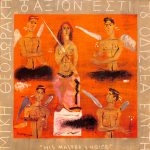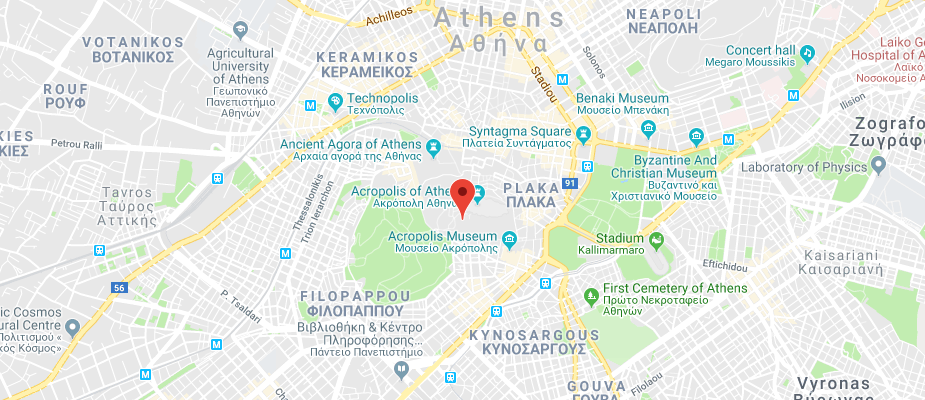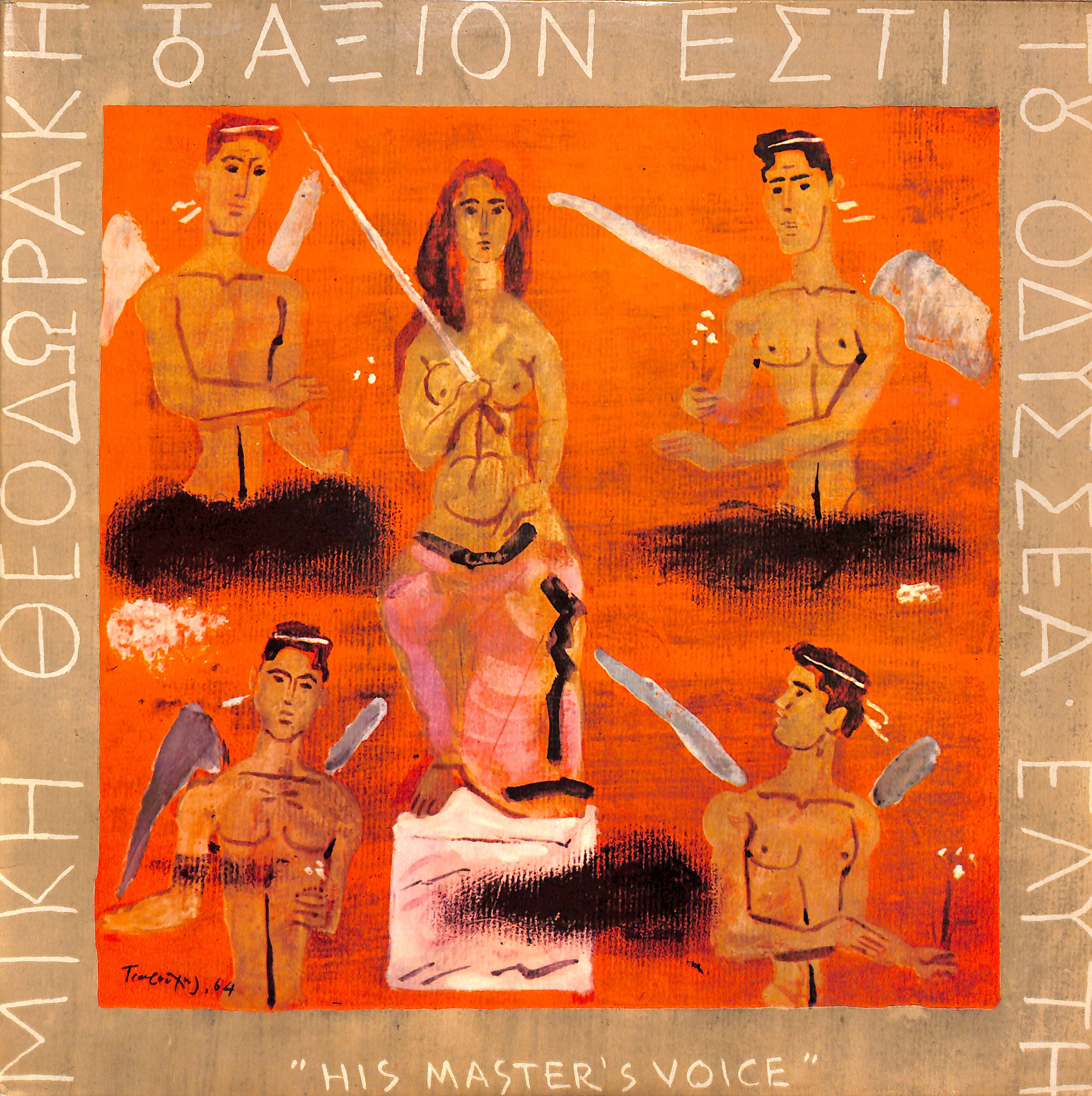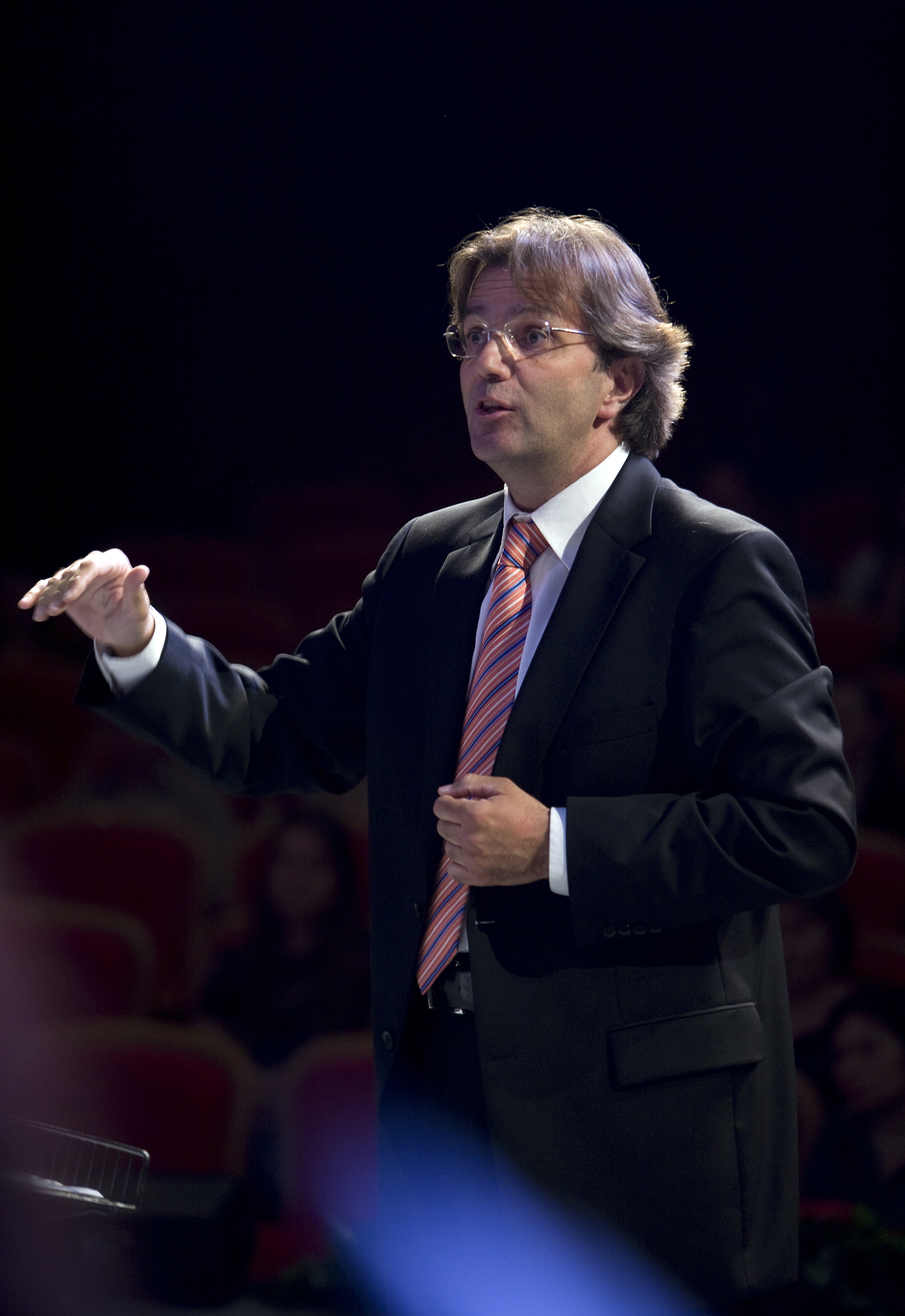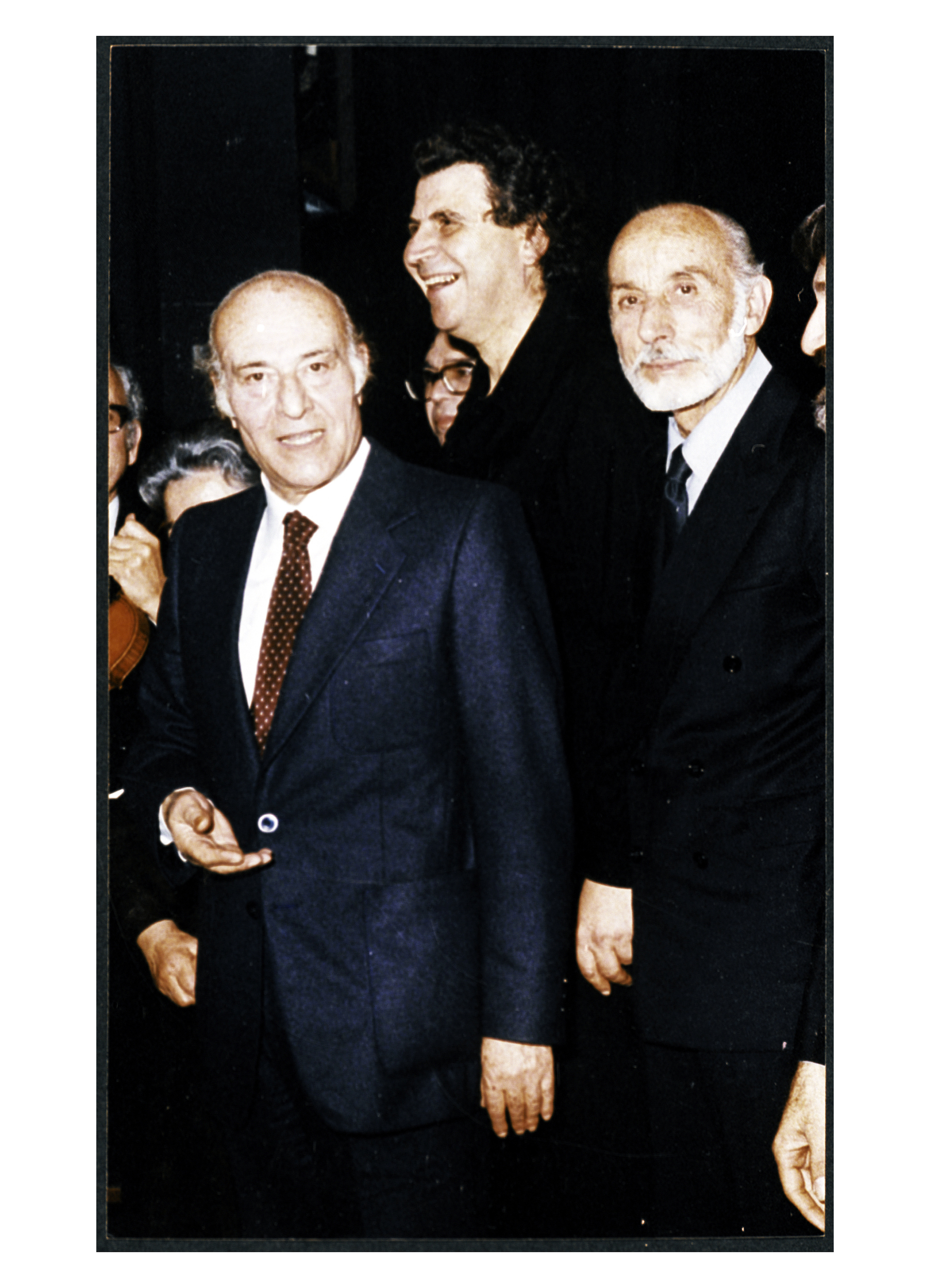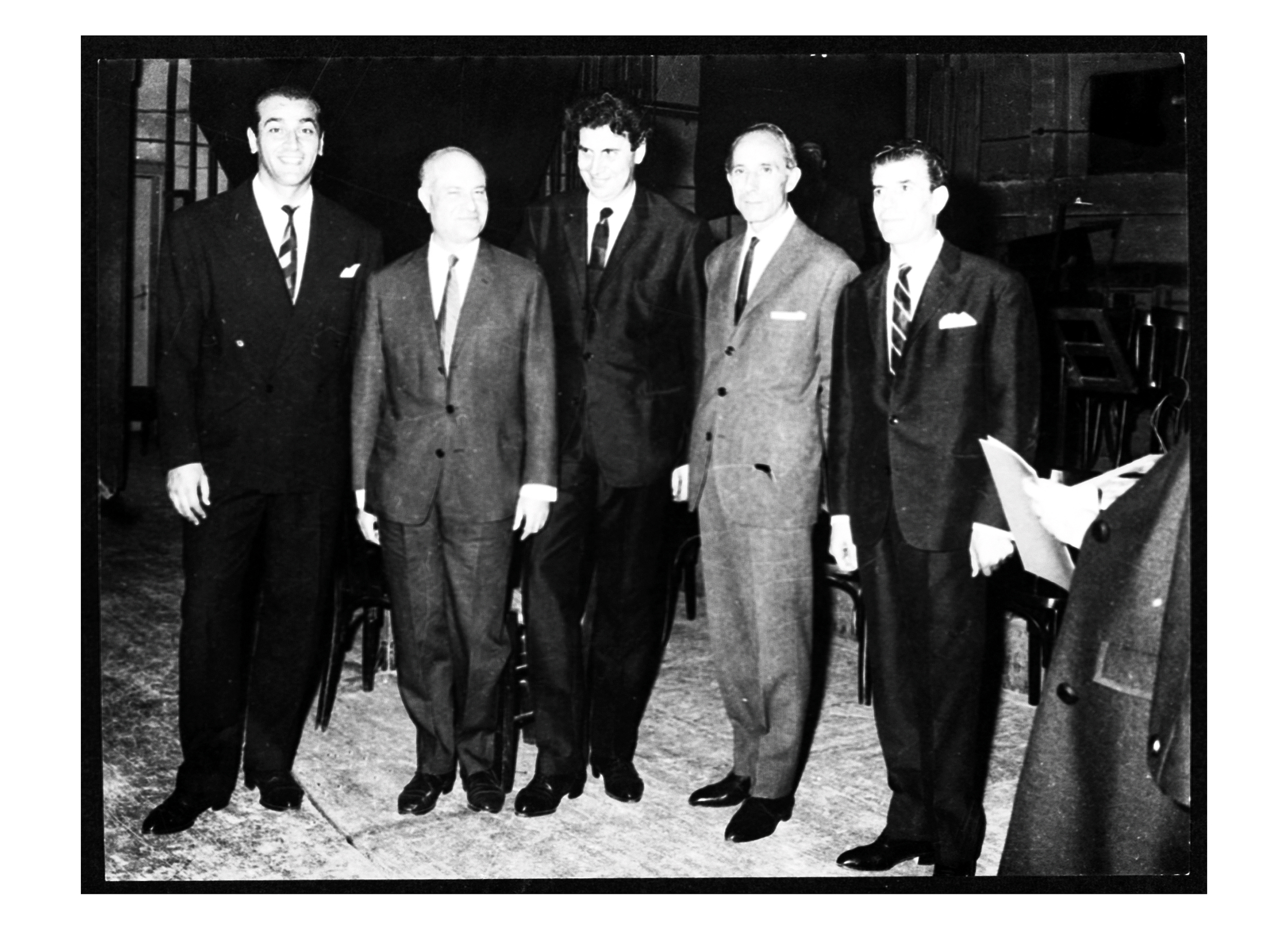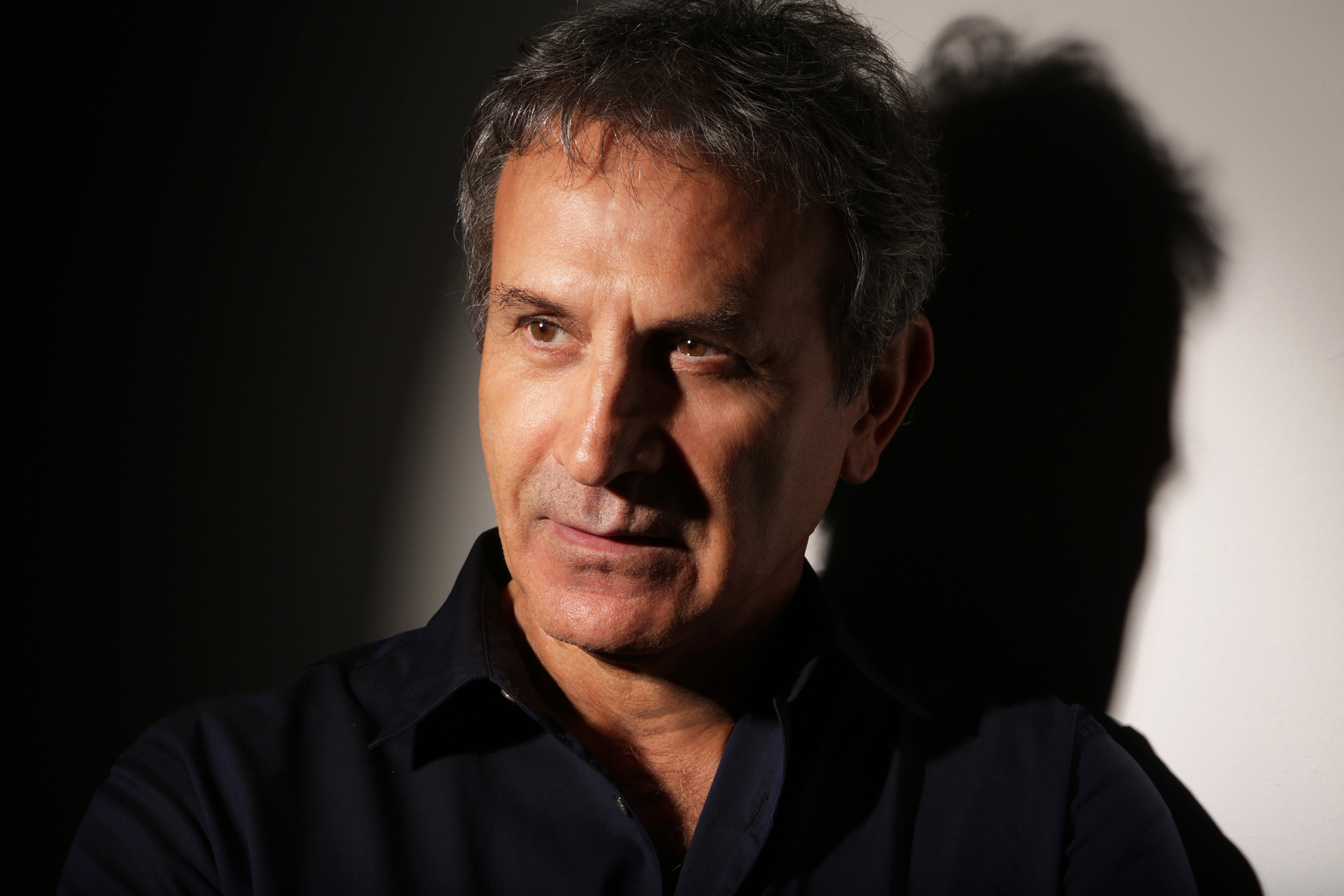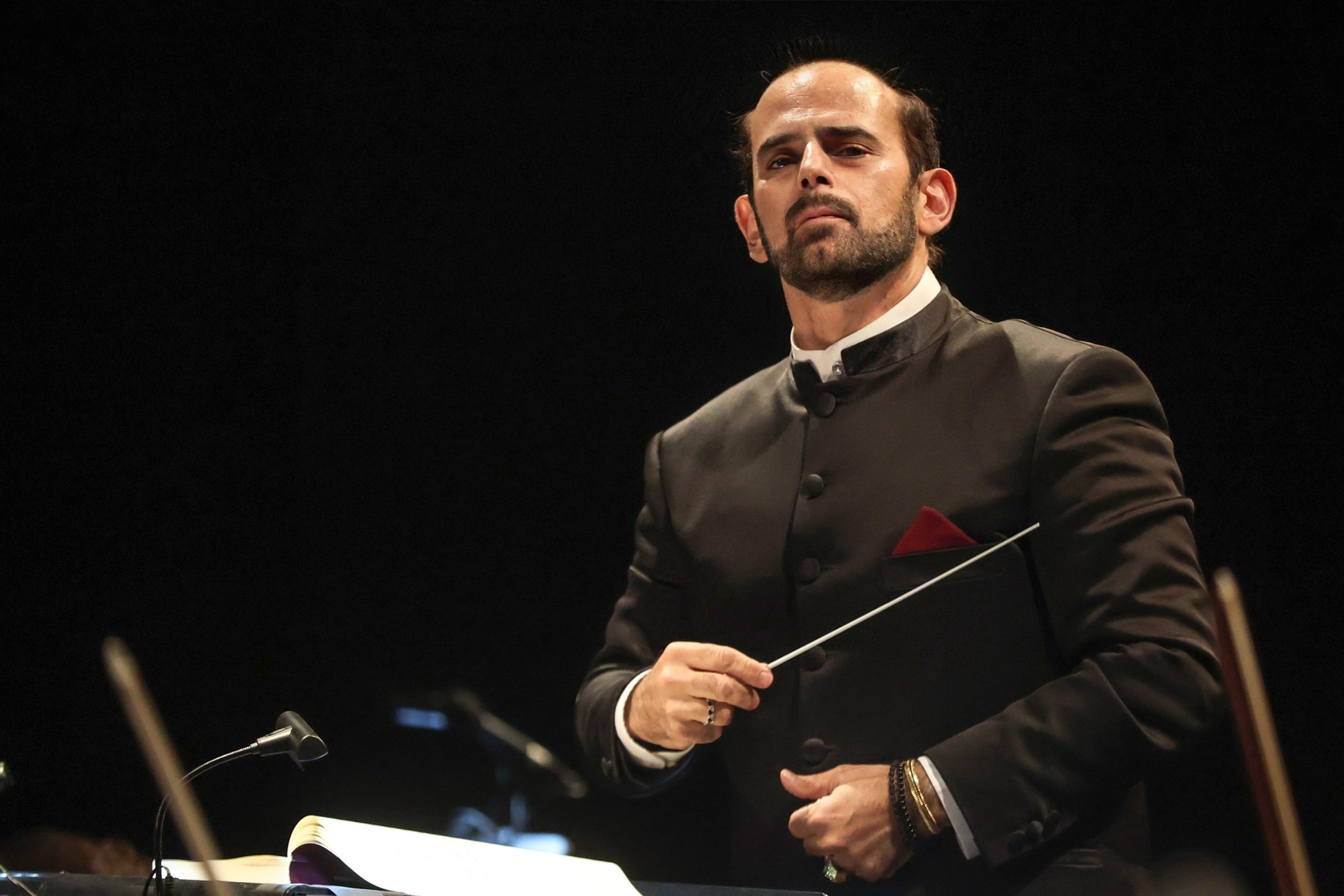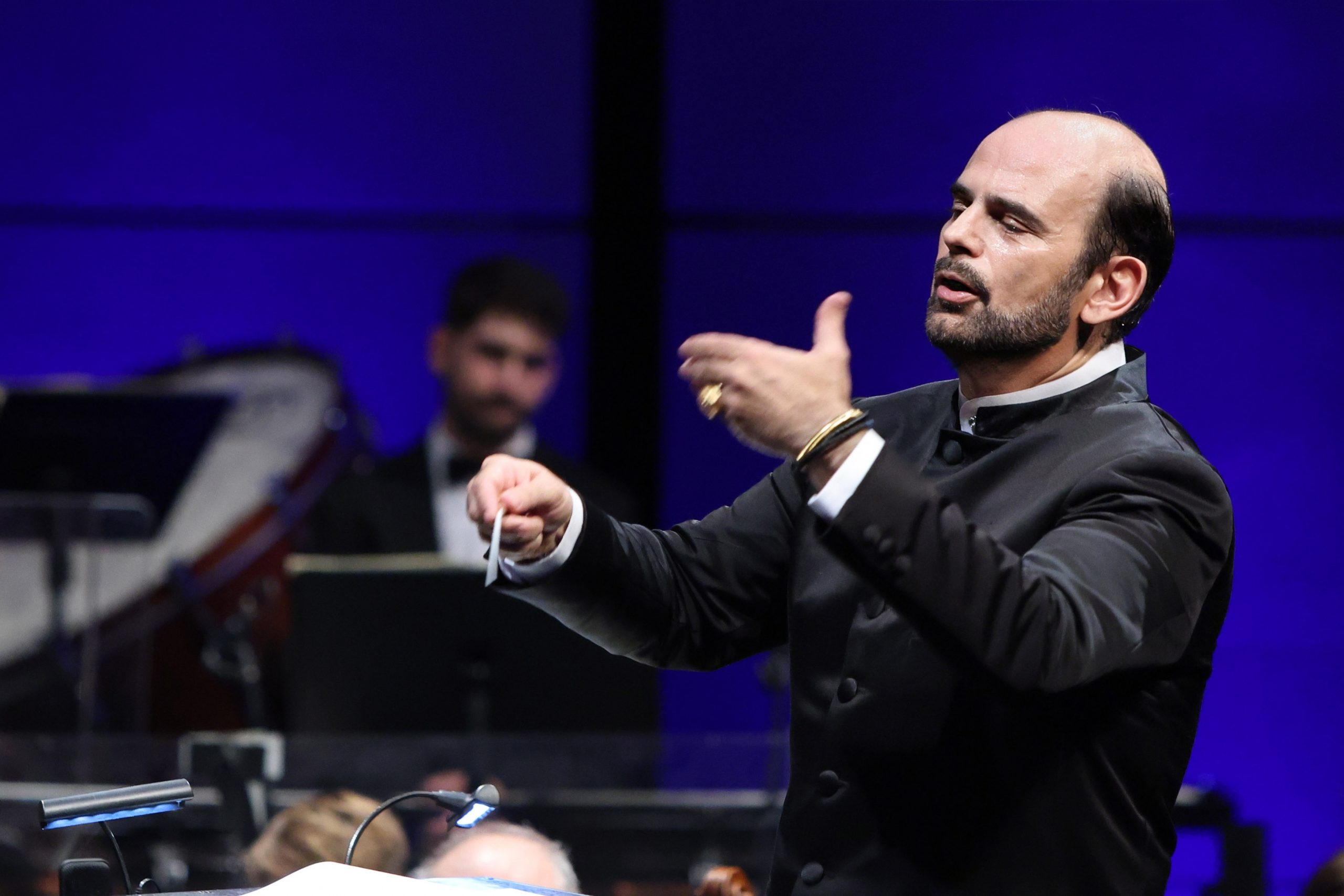Praised be the light and man's
first rock-carved prayer
the vigour in the beast leading the sun
the plant that warbled so the day rose
An undisputable masterpiece of contemporary Greek culture, Axion Esti is both an unassailable poetic composition and a majestic musical creation, written as an “oratorio populaire” for a folk singer, cantor, narrator, mixed chorus, popular orchestra, and symphonic orchestra. Published in 1959, Odysseas Elytis’ Axion Esti is at once a personal testimony and a sacred Liturgy of Hellenism in three parts: “The Genesis,” “The Passion,” and “The Gloria”—a poetic fresco of grand dimensions that reshaped Greek literature with its bold narrative architecture. At the time of its conception, the idea of adapting the work into music had not yet crossed the poet’s mind. However, two years later, Elytis sent a copy of the poem to Mikis Theodorakis. In the press conference at the work’s premiere in 1964, Mikis recalled: “I received it in Paris in the spring of 1961—a generous gift from the poet. That very evening, I had already outlined the first two parts: ‘Genesis’ and ‘The Passion’. The poem already contained the music…”. The premiere took place at the Rex Theatre-Marika Kotopouli, despite the creators’ initial wish to see it staged at the Odeon of Herodes Atticus—a request denied at the time, as Grigoris Bithikotsis’ status as a folk singer was not deemed compatible with the venue and, consequently, the stature of the Athens Epidaurus Festival. Since then, however, the work has been presented countless times at the Roman theatre, always evoking the same sacred awe—from the first awakening notes of the woodwinds in “The Genesis” to the final triumphant cry “Forever the world, the small, the great!” This year’s performance holds a particular significance as it marks the seventieth anniversary of the Festival and the centennial of the composer’s birth, in a year officially declared as the Year of Mikis Theodorakis by the Ministry of Culture. The work features George Dalaras as the folk singer, Dimitris Platanias as the cantor, and Dimitris Katalifos as the narrator, who will deliver the ecstatic and visionary recitations of “The Passion.” They will be joined by the Athens Mixed Municipal Choir, the ERT Choir, and the Athens State Orchestra.
The programme opens with the Symphonic Concerto by Manolis Kalomiris, the towering work of the frontrunner of the Greek National School of Music. Composed in the mid-1930s, it combines the composer’s lifelong quest for a genuinely “Greek” symphonic music with the solid technique he has mastered in his mature years. He christened the work “symphonic” to preemptively dispel any notion of the soloist’s predominance—an ironic choice, considering the fiendishly demanding and virtuosic piano writing. Only a handful of pianists can rise to the occasion of such a work’s performance, and Titos Gouvelis is definitely one of them. Myron Michailidis, one of Greece’s leading conductors, will accompany him on this journey.
Divided by the historical wounds of the Occupation and the Civil War, yet bound together by a shared pursuit of a deeply lived Greekness, these two emblematic works expand into previously unseen dimensions under the shadow of the Acropolis Hill. To quote Mikis once more: “We never listen only with our ears; we listen with our imagination.”
The Athens State Orchestra is conducted by Myron Michailidis.
Manolis Kalomiris (1883–1962)
Symphonic Concerto for piano and orchestra
Soloist
Titos Gouvelis
Mikis Theodorakis—Odysseas Elytis
Axion Esti
George Dalaras folk singer
Dimitris Platanias cantor
Dimitris Katalifos narrator
Athens Mixed Municipal Choir (Chorus master:
Stavros Beris)
ERT Choir (Chorus master:
Michalis Papapetrou)
With English surtitles
With the support of
OPANDA
Mikis Theodorakis—Odysseas Elytis
Axion Esti
George Dalaras folk singer
Dimitris Platanias cantor
Dimitris Katalifos narrator
Popular orchestra
George Papachristoudis piano
Giorgos Matsikas bouzouki
Giannis Stamatogiannis bouzouki
Dimitris Papangelidis guitar
Andreas Katsigiannis dulcimer
Grigoris Sintridis drums
Athens Mixed Municipal Choir (Chorus master: Stavros Beris)
ERT Choir (Chorus master: Michalis Papapetrou)
Stage engineer Antonis Zachopoulos
FOH engineer Vangelis Koulouris
Titos Gouvelis
Born in Athens, Titos Gouvelis studied piano at the Athens Conservatoire with Aris Garoufalis, the Royal College of Music in London with Peter Katin, and the Royal Scottish Academy with Fali Pavri as a scholarship holder from the Gina Bachauer International Music Association, the Onassis Foundation, and the Greek State Scholarships Foundation. For several years he studied with the renowned pianist and educator Dominique Merlet in Paris. He has also studied organ with Nicolas Kynaston as a scholarship holder from the Athens Concert Hall.
Gouvelis has won accolades in national and international competitions, including the Academy of Athens Mykoniou Prize. He has performed as a soloist with the Royal Scottish National Orchestra, the Transylvania State Philharmonic Orchestra, the Royal Bangkok Symphony Orchestra, the State and Municipal Orchestras of Athens and Thessaloniki, the ERT National Symphony Orchestra, the Camerata Friends of Music Orchestra, the Cyprus Symphony Orchestra, among others, and has collaborated with renowned conductors including M. Tilkin, Ch. Poppen, A. Ertüngealp, Β. Fidetzis, V. Christopoulos, G. Petrou, and more. He has performed as a soloist and in chamber music concerts in Greece and abroad (Great Britain, Germany, Austria, the Netherlands, Romania, Serbia, Turkey, Thailand, South Korea, Nigeria and Cyprus). His repertoire ranges from Baroque to the 21st-century. Greek music has an important place in his repertoire; he has performed (live or on recording) works by more than 60 Greek composers, including several world premieres.
Titos Gouvelis is also an editor of the Athens State Orchestra programme notes, and his writings are regularly featured in publications of the Athens Concert Hall and the Athens Epidaurus Festival. He teaches piano at the University of Athens Department of Music Studies and the Athens Conservatoire. He also hosts two classical music radio programmes on ERT (the Greek public service broadcaster).
George Dalaras
Greek singer, musician and composer, the son and grandson of musicians, George Dalaras was born in Piraeus in 1949. He embarked on his career in 1965, as a guitarist and singer, and three years later he recorded his first solo album.
From 1968 onwards, he was involved in a number of important collaborations. Kougioumtzis, Loizos, Kaldaras, Papadopoulos, and Eleftheriou were the first creators to entrust him with their songs, followed later by Theodorakis, Hadjidakis, Xarchakos, and Markopoulos – almost all Greek music composers. Notably, his international collaborations include artists such as Al Di Meola, Paco de Lucía, Sting, Ian Anderson, Goran Bregović, Emma Shapplin, Dulce Pontes, and Eddy Napoli, among others.
Since 1981, he has been taking Greek music all around the world, having performed over 1,000 concerts in the most prestigious concert halls. His collaborations with world-renowned symphony orchestras and prestigious conductors are considered milestones in his career. In 1983, 160,000 spectators attended his two concerts at the Olympic Stadium in Athens – the largest events ever held in Greece. His collaboration with the Athens Concert Hall began in 1994. The performance “...ke me fos ke me thánaton akatapáfstos” (…and with light and with death unceasingly) directed by Costa-Gavras was a historical retrospective of Greek music.
To date, he has recorded over 90 solo albums and participated in more than 140 albums as a musician, singer and producer. His album sales go beyond 18,000,000 copies. His artistic and social journey has been rewarded with many honorary distinctions.
*
George Dalaras met Mikis Theodorakis at the beginning of his career in Paris in 1972, during the dictatorship in Greece. The first fruit of their collaboration was the album 18 Lianotragouda tis pikris patridas (“18 Little Songs for the Bitter Homeland”) to poetry by Yannis Ritsos, which was released in 1974. It was actually the first songs released by Theodorakis after the ban on his music by the Greek junta was lifted following the regime’s collapse. It was followed by the recording of the songs “Kokkino triantafyllo” (Red Rose) and “Ekinos itan monos” (He Was Alone), dedicated to the memory of Greek politician Alexandros Panagoulis, and the album Radar (to poetry by Kostas Tripolitis) in 1981.
Dalaras performed in all the great post-dictatorship Theodorakis’s concerts held in stadiums all over Greece and abroad. In 1988 he performed Axion Esti conducted by the composer himself in two concerts given at the Odeon of Herodes Atticus to support the initiative for the erection of the Acropolis Museum.
Dimitri Platanias
One of the most important baritones of his generation, Dimitri Platanias was born in Kalamata, Greece. He was first trained in music at the Municipal Conservatory of Kalamata, where he attained his guitar diploma with Giannis Mavreas and his monody diploma with Maria Marketou. He continued his opera studies in Italy with Masako Tanaka Protti (having received the Alexandra Trianti Scholarship in 2000) and in Greece with Aris Christofellis.
He made his debut at the Greek National Opera as Alfio (Cavalleria Rusticana, 2004) and has since performed numerous roles, including Marcello (La bohème), Figaro/Conte (Le nozze di Figaro), Ardente (Il tabarro), Telramund (Lohengrin), Renato (Un ballo in maschera), Rigoletto, Amonasro (Aida), Germont (La traviata), Scarpia (Tosca), Conte di Luna (Il trovatore), Nabucco, Simon Boccanegra, Rodrigo (Don Carlo), Macbeth, Barnaba (La Gioconda), Stankar (Stiffelio), Gerard (Andrea Chénier), Iago (Otello), Monforte (I vespri siciliani), etc.
He has appeared in some of the world’s most prestigious opera houses: La Fenice in Venice, São Carlos in Lisbon, Bayerische Staatsoper in Munich, Staatsoper Frankfurt, Staatsoper Stuttgart, La Monnaie in Brussels, the Royal Opera House (Covent Garden), Maggio Musicale Fiorentino, Opera Valencia Reina Sofia, San Francisco Opera, Teatro Real Madrid, Staatsoper Hamburg, etc., as well as at major festivals such as the Bregenzer Festspiele and the Salzburger Osterfestspiele.
Available live recordings: Pagliacci, Osterfestspiele Salzburg, conducted by Christian Thielemann (DVD by Sony Classical; Cavalleria Rusticana/Pagliacci, The Royal Opera, conducted by Antonio Pappano (DVD by Opus Arte.
Dimitris Kataleifos
Dimitris Kataleifos is an actor and director. He was born in 1954 in Athens. He graduated from Pelos Katselis’ drama school in 1975. Since then, he has worked as an actor in theatre, cinema, and occasionally on television. He has collaborated with various theatre companies and directors, including Antonis Antypas (Aplo Theatro) and Spyros Evangelatos (Amfi-Theatro). He was a founding member of the Theatre Company “I Skini” and of “Empros” Theatre (Theatrical Organization Morfes) in Psyrri neighbourhood in Athens (whose operation contributed to the revitalization of the surrounding area). Both of these groups were among the most important theatrical nuclei of their time.
He has been awarded the Emilios Veakis Award (2002–2004) for his performances in the play Translations by Brian Friel and the one-act plays He and His Pants by Iakovos Kambanellis, Swan Song by Anton Chekhov, and Krapp’s Last Tape by Samuel Beckett. He received the audience award from Athinorama magazine (2011) for Translations by Friel, Ghosts by Henrik Ibsen, and The Caretaker by Harold Pinter.
He has also been directing for the theatre since 1998 (Don Juan Comes Back from the War, Empros Theatre). In cinema, notable appearances include The Stone Years (1985) by Pantelis Voulgaris and Theofilos (1987) by Lakis Papastathis (for which he won Best Actor at the Thessaloniki Film Festival).
He has taught acting at the drama schools of the National Theatre of Greece and the National Theatre of Northern Greece, the Theatre Studies departments of the University of Athens (EKPA) and the University of Patras, and in the Theatre Department of Aristotle University of Thessaloniki (AUTH), among others. From 1993 to 2000, he was a co-founder of the Empros drama school.
Myron Michailidis
Widely regarded as one of the most important Greek conductors, Maestro Myron Michailidis is since 2019 the very first Artistic Director of the new Cultural and Conference Center of Crete (CCCC), in Heraklion, Greece. From 2008 to 2022 he was the General Music Director of the Philharmonic Orchestra and Theatre Erfurt, Germany.
Appointed Chevalier de l’Ordre des Arts et des Lettres by the French Republic in 2016, Michailidis served as Artistic Director and Chief Conductor of the Greek National Opera from 2011 to 2017. His contributions to the institution’s achievements were honoured with the Society of Friends of the Greek National Opera’s prestigious “Apollo Award” in his final year. Prior to his tenure as Artistic Director and Chief Conductor of The Greek National Opera, Michailidis was Artistic Director and Chief Conductor of the Thessaloniki State Symphony Orchestra, a post he held from 2004 to 2011. From 1999 to 2004 he further served as Permanent Conductor at the Eastern Saxony Opera in Germany.
He has conducted some of the world’s most renowned orchestras, including the Berlin Symphony Orchestra, Vienna Chamber Orchestra, Rome Symphonic Orchestra, Shanghai Opera House Orchestra, Slovak Philharmonic Orchestra, Jerusalem Symphony Orchestra, Bucharest National Opera, Staatsorchester Braunschweig, George Enescu Philharmonic Orchestra, Prague Radio Symphony Orchestra, Sofia Philharmonic Orchestra, Mexico State Orchestra, Odessa Philharmonic Orchestra, as well as all of the major orchestras in Greece. While with the Thessaloniki State Symphony Orchestra, Michailidis took the Orchestra on tour to Beijing China, host of the 2008 Olympic Games.
A prolific recording artist, Michailidis’ 2012 EMI Classics recording of Beethoven’s 3rd and 4th piano concertos with the legendary French-Italian pianist Aldo Ciccolini received exceptional international acclaim. His recording of works by the Italian composer Ildebrando Pizzetti for Naxos, including several world premieres, earned Michailidis stellar reviews with five Diapasons by the French magazine in 2009, and several awards. Two years prior, his first Naxos CD featuring Theodore Kerkezos and works by 20th century Greek composers won the Pizzicato Classics “Supersonic Award” and two Grammy Award nominations.
Following his piano studies with Dimitris Toufexis in Athens, Michailidis studied conducting with Hans-Martin Rabenstein at the Universität der Künste Berlin. He also holds a law degree from the University of Athens.
Athens State Orchestra
The Athens State Orchestra is the oldest orchestral ensemble in Greece. Founded in the late 19th century as the Athens Conservatory Symphony Orchestra, it went through various names as well as forms of operation. Its first concert as the Athens State Orchestra was held on February 28th, 1943.
Ever since its foundation, the Athens State Orchestra has been offering to the Greek audience the opportunity to get acquainted with the masterpieces of the world’s repertoire, while it’s the main interpreter of the local music. It has achieved a consistent presence on the Greek cultural scene, performing more than fifty concerts per year. Besides Athens, the Athens State Orchestra regularly appears in many Greek cities, as well as in prestigious venues and festivals abroad. Its social and educational program throughout Greece is quite significant.
Over its long history, the Athens State Orchestra has performed under the direction of eminent conductors such as Richard Strauss, Felix Weingartner, Hans Knappertsbusch, Bruno Walter, Dimitri Mitropoulos, Eugen Jochum, Igor Markevitch, Lorin Maazel, Clemens Krauss, Yuri Temirkanov, Michel Plasson, Vladimir Ashkenazy and Vladimir Fedoseyef and has accompanied outstanding soloists, among whom Arthur Rubenstein, Wilhelm Kempff, Alfred Cortot, Fritz Kreisler, Jacques Thibaud, Pablo Casals, Vadim Repin, Gidon Kremer, Mstislav Rostropovich, Alfred Brendel, Daniel Barenboim, Martha Argerich, Elisabeth Leonskaya and Leonidas Kavakos.
Former Artistic Directors of the Orchestra have been Filoktitis Oikonomidis, Theodoros Vavagiannis, Andreas Paridis, Manos Hadjidakis, Giannis Ioannidis, Alexandros Symeonidis, Aris Garoufalis, Byron Fidetzis, Vassilis Christopoulos and Stefanos Tsialis. Since October 2020, Loukas Karytinos is the Artistic Director of the Athens State Orchestra.
ERT Choir
The ERT Choir (i.e. the Choir of the Hellenic Broadcasting Corporation) was founded in 1977 by Manos Hadjidakis, then director of the ERT Third Radio Programme, as Third Programme Choir, in collaboration with Antonis Kontogeorgiou as manager and principal choirmaster. It soon stood out as one of the best choirs in Europe.
As part of developing its repertoire, which includes over 1,000 compositions from all periods of choral music, particular emphasis has been placed on the first performances of Greek works (240 works for choir and orchestra as well as a cappella choral works). The Choir’s repertoire also includes many operas.
Under Mikis Theodorakis’ direction, the ERT Choir performed numerous concerts in Italy, France, Germany, Tunisia, the United States, Canada, Finland, and elsewhere. In 2004 it took part in the opening and closing ceremonies of the Olympic Games in Athens, and in 2007 it performed at the Ancient Theatre of Epidaurus, the Alte Oper in Frankfurt and the Beijing Poly Theater, where it gave the opening concert as part of the Greek cultural year in China.
It has collaborated with renowned Greek and international orchestras such as the Berlin Symphony Orchestra, the Nuremberg Symphony Orchestra, the London Philharmonic Orchestra, the Capitole de Toulouse National Orchestra, and many esteemed Greek and foreign conductors including K. Masur, Y. Menouhin, V. Ashkenazy, I. Fischer, H. Rilling, and N. Marriner.
Since January 2023, the ERT Choir has been led by Michalis Papapetrou.
City of Athens Choir
Aspiring to bridge the gap between purely lyrical or symphonic repertoire, the Athenian polyphonic tradition, and contemporary music, the City of Athens Choir was founded in 1999 as the third professional choir in Greece and one of the five independent musical ensembles of the City of Athens.
Formed by professional singers with classical training and extensive experience in other musical fields, it quickly came to play an important role in the cultural life of the Greek capital, gaining a loyal audience, and presenting all genres of vocal music: Greek and international, contemporary and classical. It is sought after by composers and conductors alike due to its diverse range and collaborates regularly with all the major musical ensembles in Greece and institutions such as the Athens and Thessaloniki Concert Halls, the Athens Epidaurus Festival, the Benaki Museum, the Onassis Cultural Centre and the Alternative Stage of the Greek National Opera, under the baton of many renowned conductors such as Stefan Lano, Loukas Karytinos, Nikos Athineos, Byron Fidetzis, Myron Michailidis, Stavros Xarchakos, Miltos Logiadis, Alkis Baltas, Alexandros Myrat, George Petrou, Nikos Vassiliou, Andreas Pylarinos, Angelo Cavallaro, and others.
Special moments in the choir’s history include international collaborations with Jean-Michel Jarre and Ennio Morricone at the Odeon of Herodes Atticus, as well as performances at the Valery Gergiev’s Easter Festival in Moscow, the Istanbul International Music Festival presenting Xenakis’ Oresteia conducted by Gürer Aykal, and the Ravenna Festival presenting Beethoven's Symphony No. 9 led by Riccardo Muti.
In addition to its artistic achievements, the Choir carries out valuable community work, presenting specially selected vocal music programmes at schools, friendship clubs, retirement homes, and remote neighbourhoods of the city, and often participates in events organised by charitable and philanthropic organisations.
The Choir’s director, since its inception, has been Stavros Beris.
